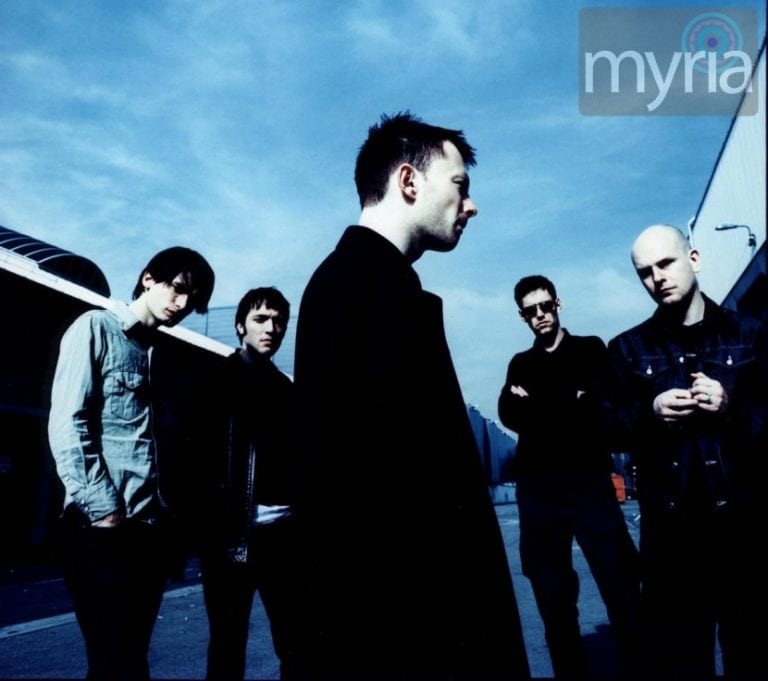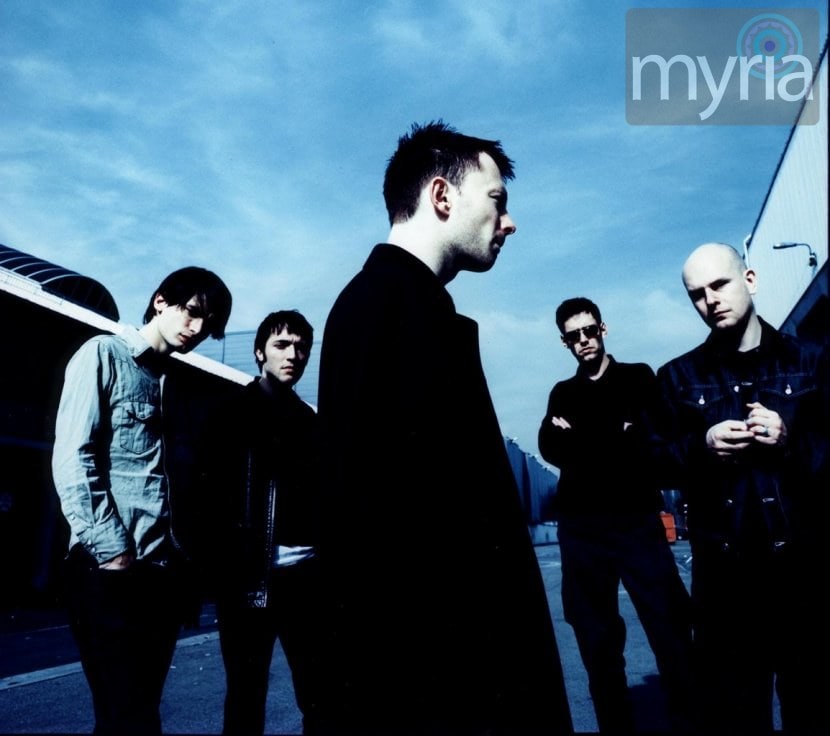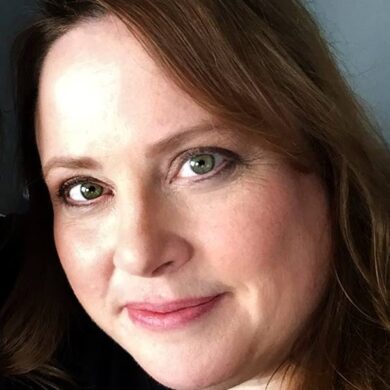Get insight into the life & times of Radiohead in this 1997 interview
Radiohead’s Jonny Greenwood — he of the manic, talking guitar — is standing in the lobby as I arrive at the trendy San Francisco hotel where the band is staying.
Alas, Jonny isn’t waiting for me, and Ed O’Brien, Radiohead’s other able guitarist and my intended interview subject, is still asleep.
Somewhere between San Francisco and Capitol’s offices in New York, wires were crossed, and I got there an hour earlier than expected. “He’s just going to take a shower and will be right down,” their publicist apologizes.
by Nancy J Price
Unexpected wakeup calls aside, things are looking good for Radiohead. Their third LP, OK Computer, debuted at number 21 in the US and easily reached the top of the charts in their native Britain.
O’Brien and Jonny Greenwood, together with Jonny’s brother Colin on bass, Phil Selway behind the drums, and the owner of the breathtakingly lovely vocal contortions — singer/guitarist Thom Yorke — are Radiohead.
The group (who don’t consider themselves part of the “Britpop” movement, alongside bands like Blur, The Verve, Pulp et al), has been playing sold-out shows across America, performing at venues with names including words like Theatre, Ballroom and Arena — certainly a step up from the club tours of the not-too-distant past.
This band has been busy this last year: recording, touring, promoting, playing for Tibetan Freedom, and getting favorable attention from the press and an ever-increasing legion of fans. Even before the July first stateside release of the album, the band was getting the kind of attention usually reserved for music legends, fashion designers, and boxers. Face it: when you can count Madonna, Marilyn Manson, Sheryl Crow and members of U2, REM and Oasis among your fans, you’re either doing something right or something revolutionary… or, in the case of Radiohead, very probably both.
Our interview with Radiohead’s Ed
At the Warfield Theatre in San Francisco, their tight 22-song set (including four songs over three encores), included every track from OK Computer, half of The Bends, a lone number from their debut, Pablo Honey, and one B-side for the devout. The band’s success would seem to be a natural result of their clear passion for the music, an obvious and mutual creative respect, and the fact that, well, they seem to be having a good time just being Radiohead.
But was recording the songs as much fun as playing them in front of an audience? O’Brien smiles, “We did kind of go a bit stir crazy recording OK Computer, when we were in Bath at Jane Seymour’s house, but we had to go through that. We got to Christmas of ‘96, and we’d been kind of experimenting. The only thing we’d finished was ‘Exit Music,’ because that had to go to Romeo and Juliet for the film. We had started about fourteen or fifteen songs, and it was then that we said, ‘Right, we’re going to have to start finishing stuff off.’ What we’d do is half-finish fourteen songs, and then go on to a new one. We get bored very very quickly. So, by Christmas, it was basically that we wanted an album out by the summer, and we had to finish it off.”
Well-versed in the fine art of procrastination, I imagine it was difficult to complete those songs. Nodding a deep yes, O’Brien says, “It’s all the little bits. We tracked a lot of this album live.” He pauses and searches the air for an analogy. “It would be like building a kitchen. It’s quite easy to get all the wood in and see something fairly immediate — but all those little joints and the hinges, and making sure the drawers and the cupboards open properly, and fixing all the little things — that’s what takes a really long time. Smoothing down the edges. It’s exactly the same when making a record. And mixing… mixing is kind of like the French polishing. It was fairly traumatic at times, because there’s so much going on.”
Anyone can play guitar
Radiohead’s career development has been upward, if not smooth, since their days playing around Oxford as a band called On A Friday. Such progress comes directly from their unwavering dedication to the cause. O’Brien reckons they’ve all known since their mid-teens that they wanted to play together. “There was never any question that we weren’t going to do it, really, in terms of like make the effort to do it.” Although the band was on hold during their college years — re-forming only during school breaks — they maintained that group cohesion, “and [after] Thom finished college, we were signed in about four or five months. Looking back on it, what was amazing was the commitment. Ten years ago, we talked about it. We knew we wanted to do this — there was never any question.”
As most of the members are in their late twenties, it’s been nearly half a lifetime since the band’s humble beginnings. Has the success they’ve finally achieved with the release of OK Computer seemed a long time coming?
“It’s been fine. You know, the big thing was signing at the end of ‘91, then in ‘92 touring around in a rusty white van. It was great to do small shows, opening up for people. 1993 — the first half of the year was really the same as ‘92, then of course ‘Creep’ erupted, and we came over here,” recalls O’Brien. “‘Creep’ was not what we expected. We all thought [the band’s progress] would be slow — we didn’t want any kind of big explosion. We wanted to — each time you do a gig, a few more people come along, word of mouth spreads, make a better record…”
But are they satisfied? “Yeah, now,” he concedes. “We played the Warfield in San Francisco, we played the Wiltern in Los Angeles. We’ve played clubs, and they were great, but we’ve done three [U.S.] tours of clubs and you get a bit sick of them. It sounds better in these [larger] places. It looks amazing — you look out from the stage and there’s a balcony, and it’s very inspiring.”
Of course, as the band’s fan base grows, they’ll start to play larger venues. “Obviously when you get great theaters, it would be lovely to do a residency for three nights, but, America is such a huge country that you wouldn’t have the luxury of that. If you’ve got one night, you don’t want people to not get in. We’ve done that where we played at a way way smaller venue than we should have.’
On the other end of the spectrum, does he see an arena tour in the band’s future? “No, not really… we’ve never thought about it. There’s more talk about it around us — people speculating — particularly in Britain. They all think we’re going to be the next stadium band. Take U2 and REM’s baton,” he scoffs. “If it happens, it happens, but the only way it will happen is if we’re comfortable with that… which we’re not at the moment. And as long as the show’s not compromised.” O’Brien explains, “I know it’s possible to do amazing shows: I saw the U2 Pop-Mart thing. There’s no way you could do that inside — it’s phenomenal. It was very moving, it was very personal at times, and it was extravagant and over the top. And it was fantastic. That’s the way to do those things.”
Lucky
Radiohead are one of a handful of bands who clearly seem to be plugged into the nineties, and even own their namesake domains (radiohead.com and, for Europe, radiohead.co.uk). The website itself is certainly unique with its spartan content. “Stanley Donwood does the website and does the artwork with Thom,” explains O’Brien. ‘We just didn’t want to do one of those websites that is basically like ‘here’s a picture of the band, here’s the band on the set of their latest video, you can buy the video, you can buy the new single out now.’ We wanted something that provoked a bit more of a reaction — you either love it or hate it. People think it’s interesting… and then other people say, “Why can’t I get the chords to “Creep?”’”
Although the band may not visit their virtual home too often, they are, at least, computer literate. “Oh, completely — yeah. Totally. Colin and Thom have got Powerbooks out on the road, Jonny’s going to buy a Powerbook.” So do they do much websurfing? “Yeah,” O’Brien replies, “I find it so boring, though. I personally feel the best thing about the internet is the text. The graphics — it takes so bloody long to download anything. The text is the stuff that interests me.”
O’Brien does, however, attest to the power of the web. “When we’re in the studio — the day after we tracked the songs, there was a website saying the songs we were recording. We have no idea — no idea — how they got the names of the songs. Okay, some of them we played live, some of them we haven’t. There’s no way. Stuff that had been written the night before, been tracked. Really weird. I just have got a feeling that one of the others in the band was going onto the computer about three in the morning and being a mole… and that’s cool, that’s fine.”
There’s certainly a major demand for news about the band in the online world. Radiohead’s internet devotees span the globe — in fact, the UBL (Ultimate Band List) mentions more than seventy sites dedicated to the band, and their high-volume mailing list has over four hundred members… well, four hundred, and, on occasion, another five. O’Brien smiles, “When we were in the studio, we’d occasionally go in on that. They wouldn’t believe who we were. They told us to get off.”
For real-time online interaction, fans will pretty much have to wait for one of the numerous online chats featuring the band, or, as the case may be, the band minus O’Brien: “I always avoid [chats]. I’ve done it once. I’m not that interested at all. You’ve always got some person regulating it, and I don’t want to have just the ‘good’ questions. I want to see what else is being said, and it’s really frustrating to have that ‘We can’t show the band that question.’ If someone says, ‘You guys, you suck, I hate your album,’ I want to retort — I want to respond to that.”
Personally, his favorite aspects of Internet connectivity vary. On the web, he admits to liking “things like typing in a word and seeing where it gets you. I’m also a big soccer fan — Manchester United — so I check out the MU sites, and there are a lot.” And though he has a Mac at home, “on the road, I can’t get any of the world wide web. I do email with a palmtop — you can get text only.”
The written word — that text — is apparently where his passion lies. “I love email — email is brilliant. It changes the way we talk. Suddenly, you’re getting letters on the road. Contact, rather than you sending and it being one way the whole time.”
No surprises
Contact with home and the outside world in general would be vital for anyone on the road, holed up with other band members and crew for sometimes months on end. Still, even when they’re back home, it sounds like they just can’t be apart for too long. “We all live in Oxford. If we’re back for months, we see other friends and chill out, and then by the second week, we’re phoning one another up, saying, ‘What are you doing?’”
That honest, undiluted friendship is the foundation upon which Radiohead have built their remarkable career. It is also what motivates them to move forward. Of the future, O’Brien says he sees the band’s goal as, “fairly simply, to continue making good and better records. And remain friends, really. Remain friends and remain human beings.”
A moment’s pause, then he clarifies, “If for one moment I believed that me and the band as a whole had become rock and roll casualties who don’t get on, who become twisted… you see a lot of these old rock and rollers — unwilling to take the rough, having had the smooth — then I wouldn’t carry on. I’m not interested in compromising our characters or becoming rock and roll assholes. Not interested in that at all.”










